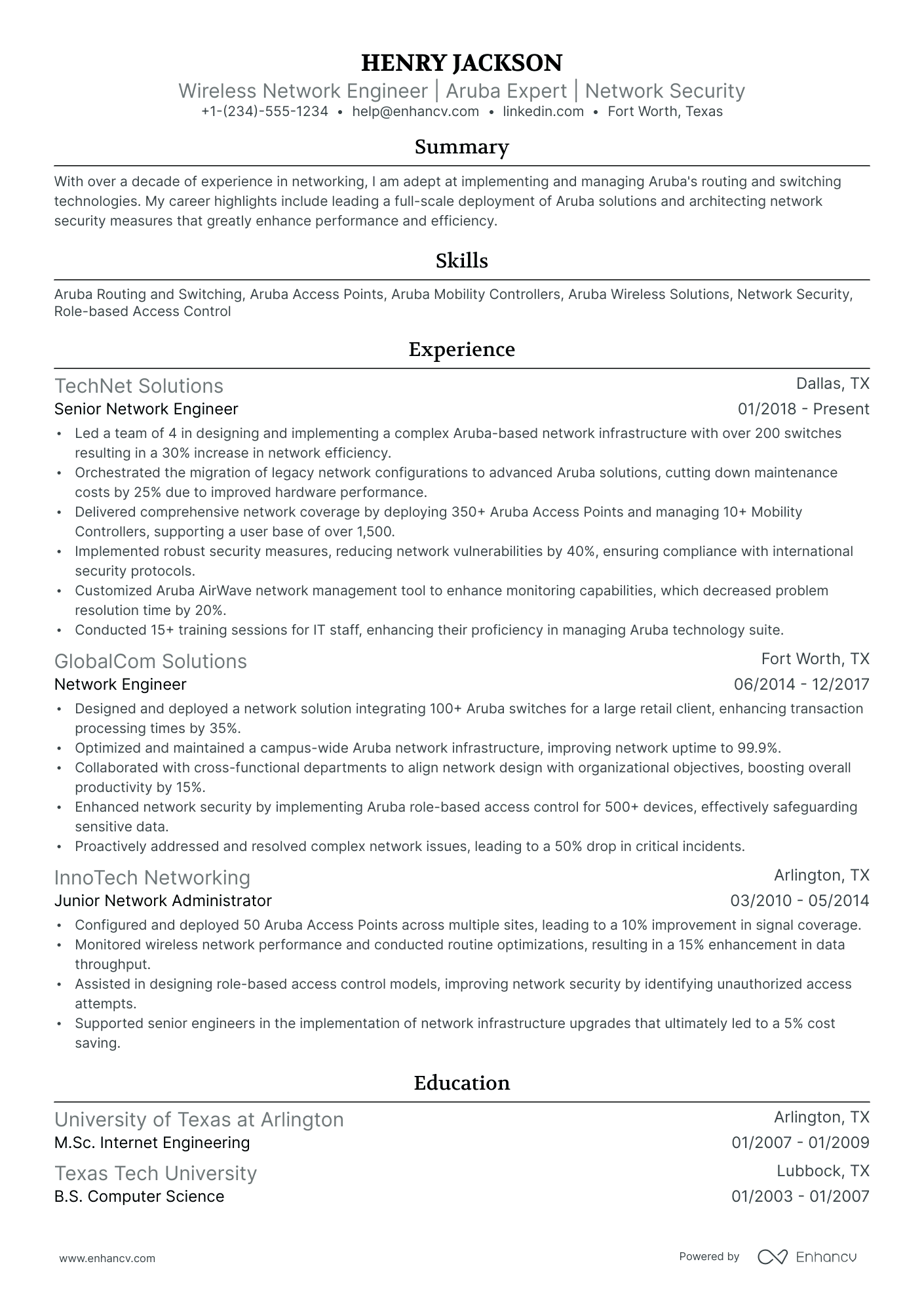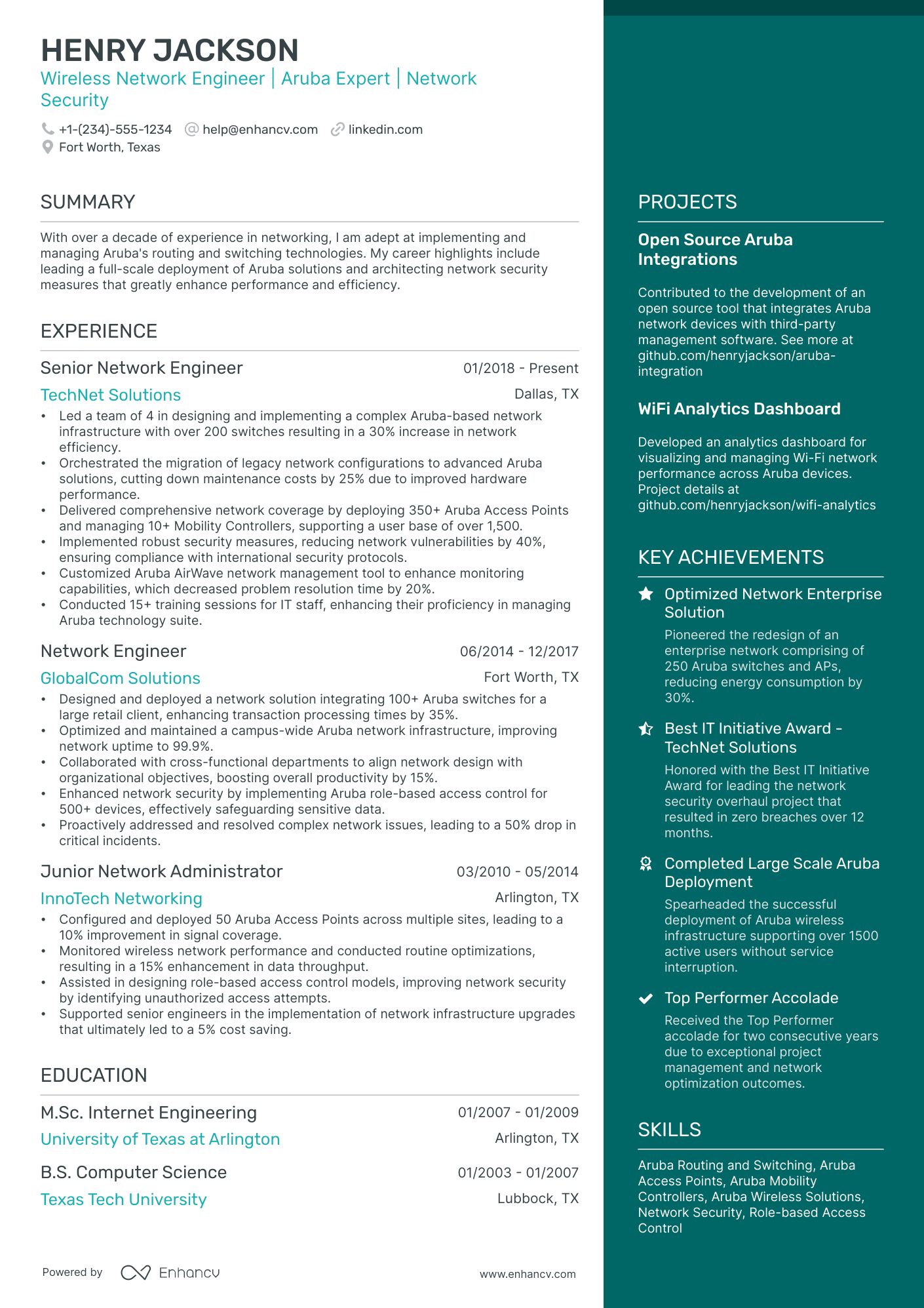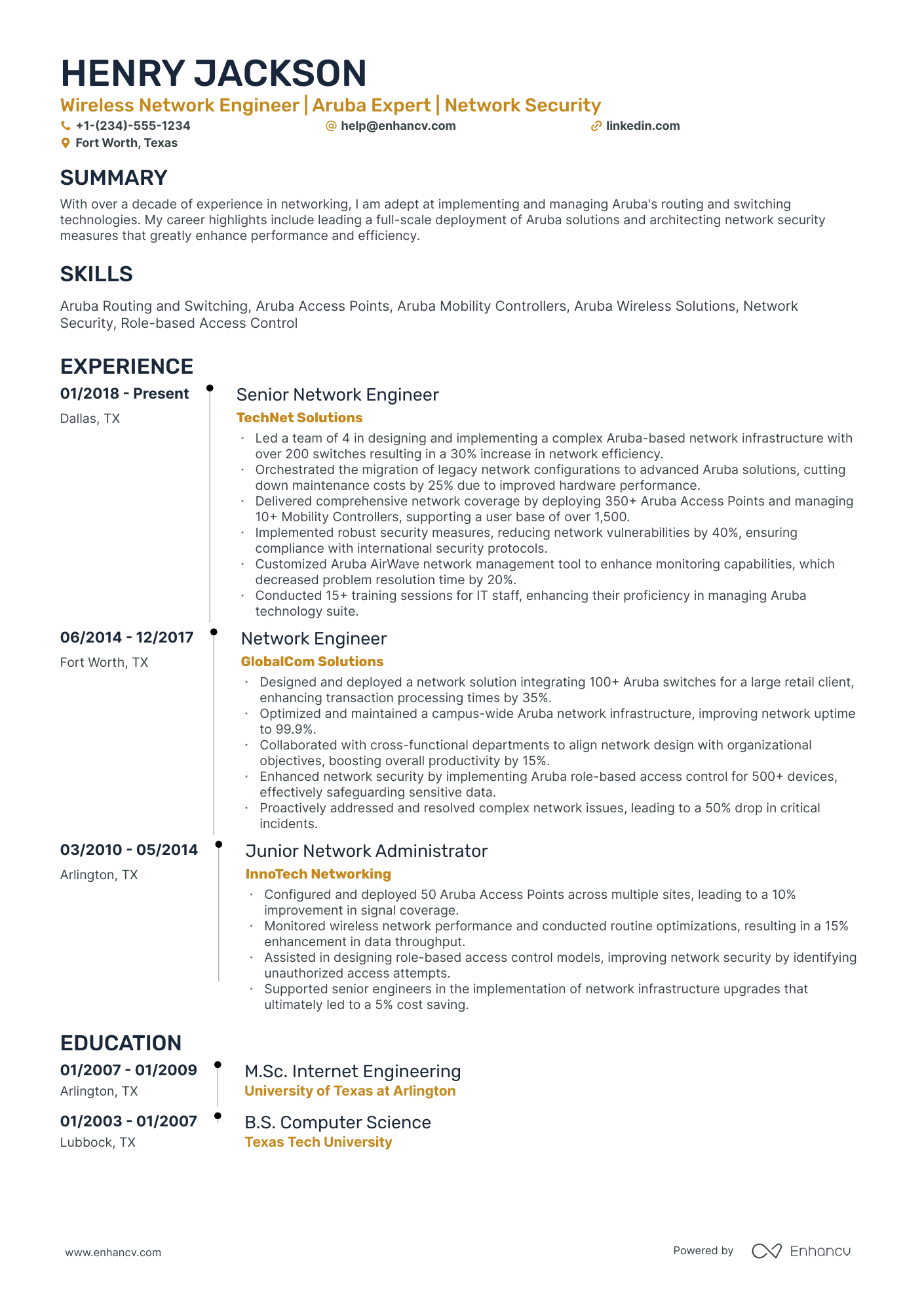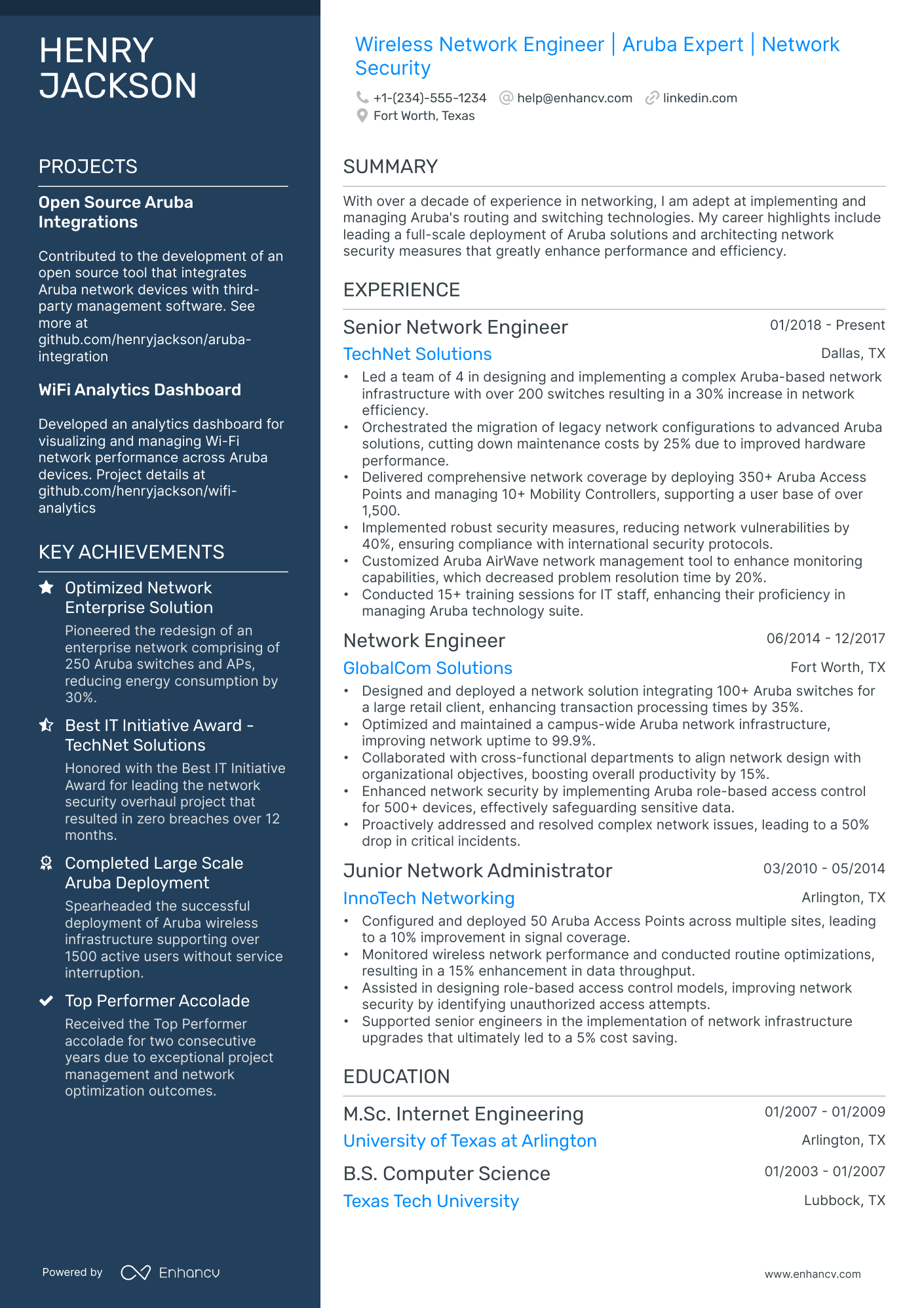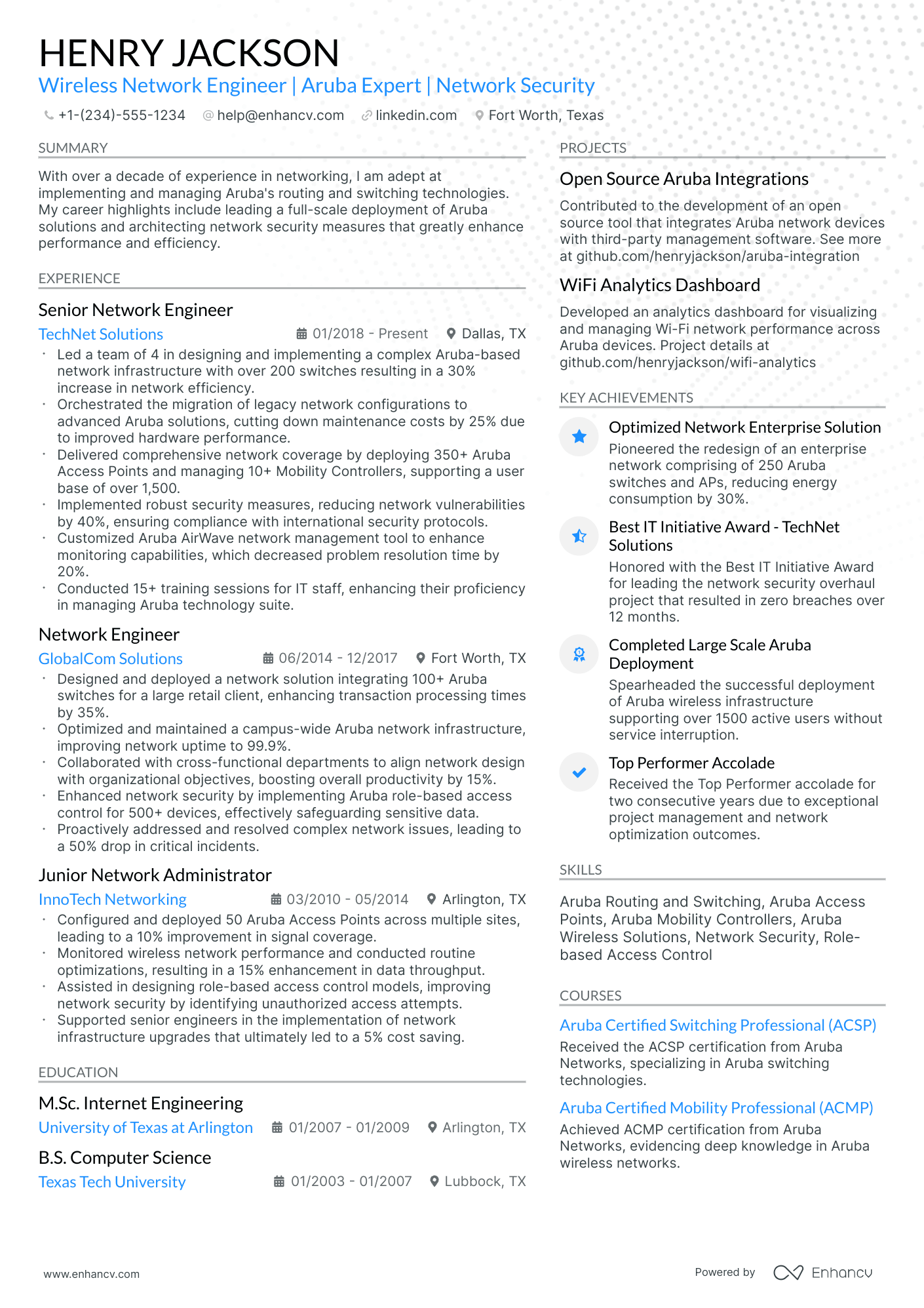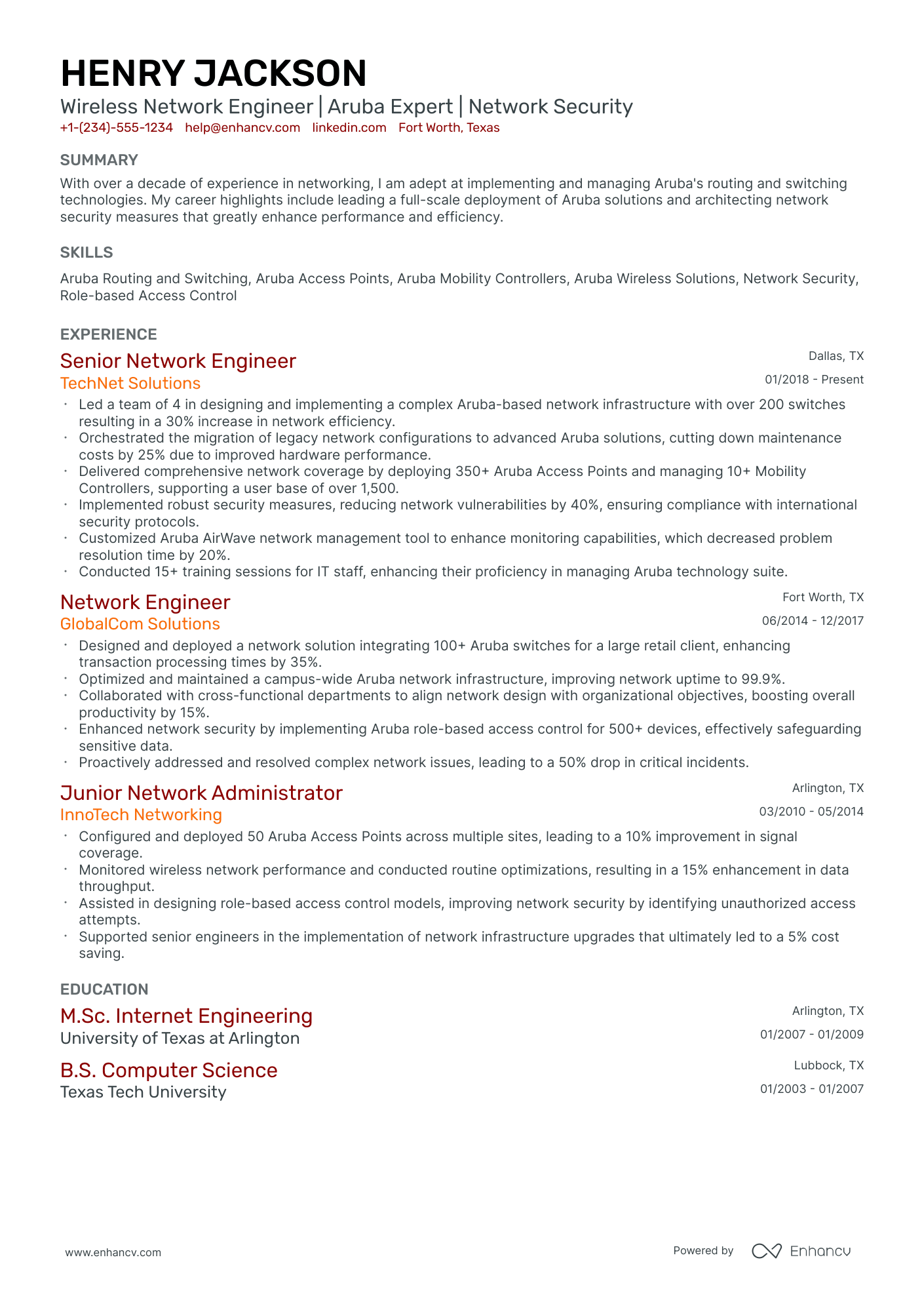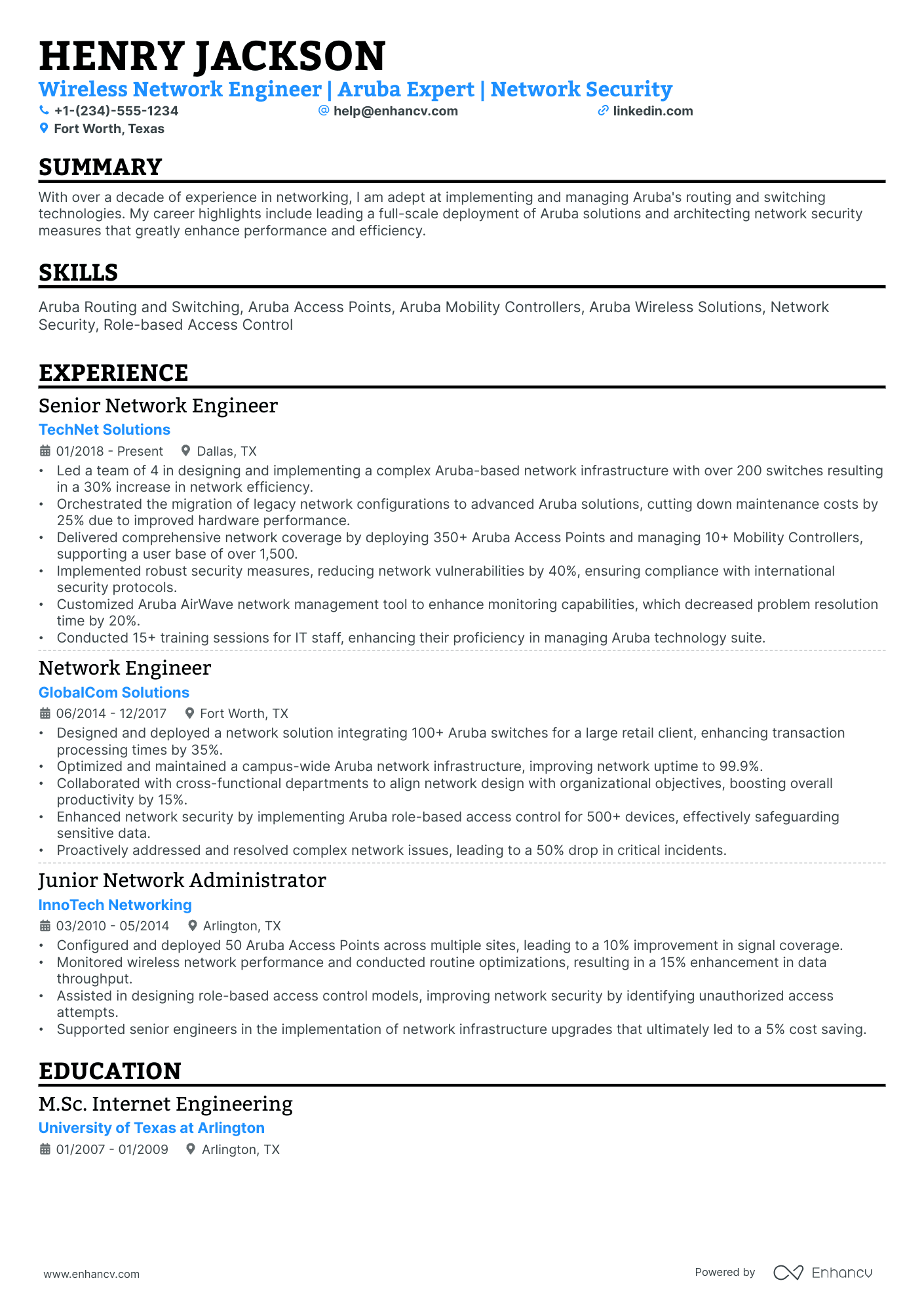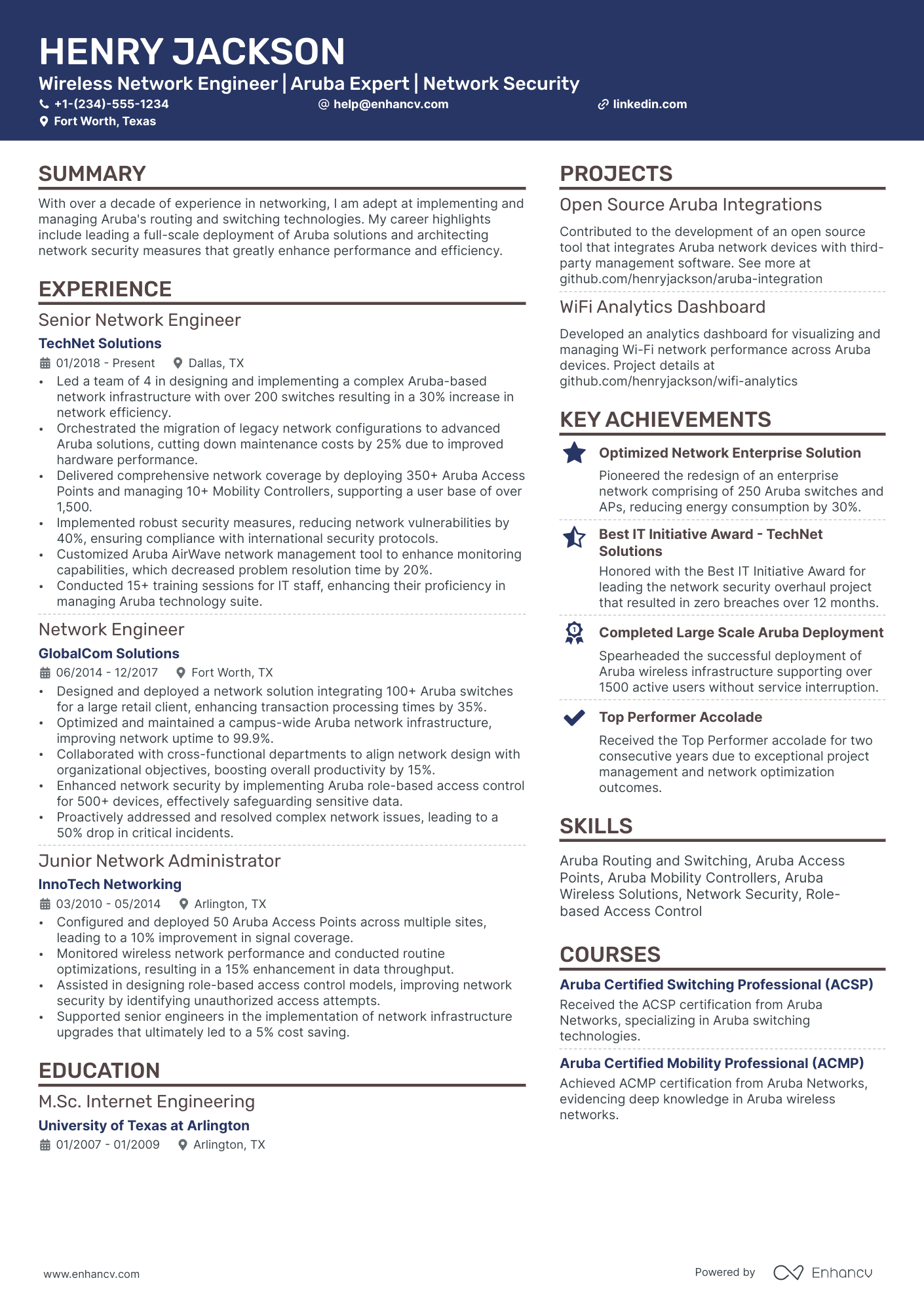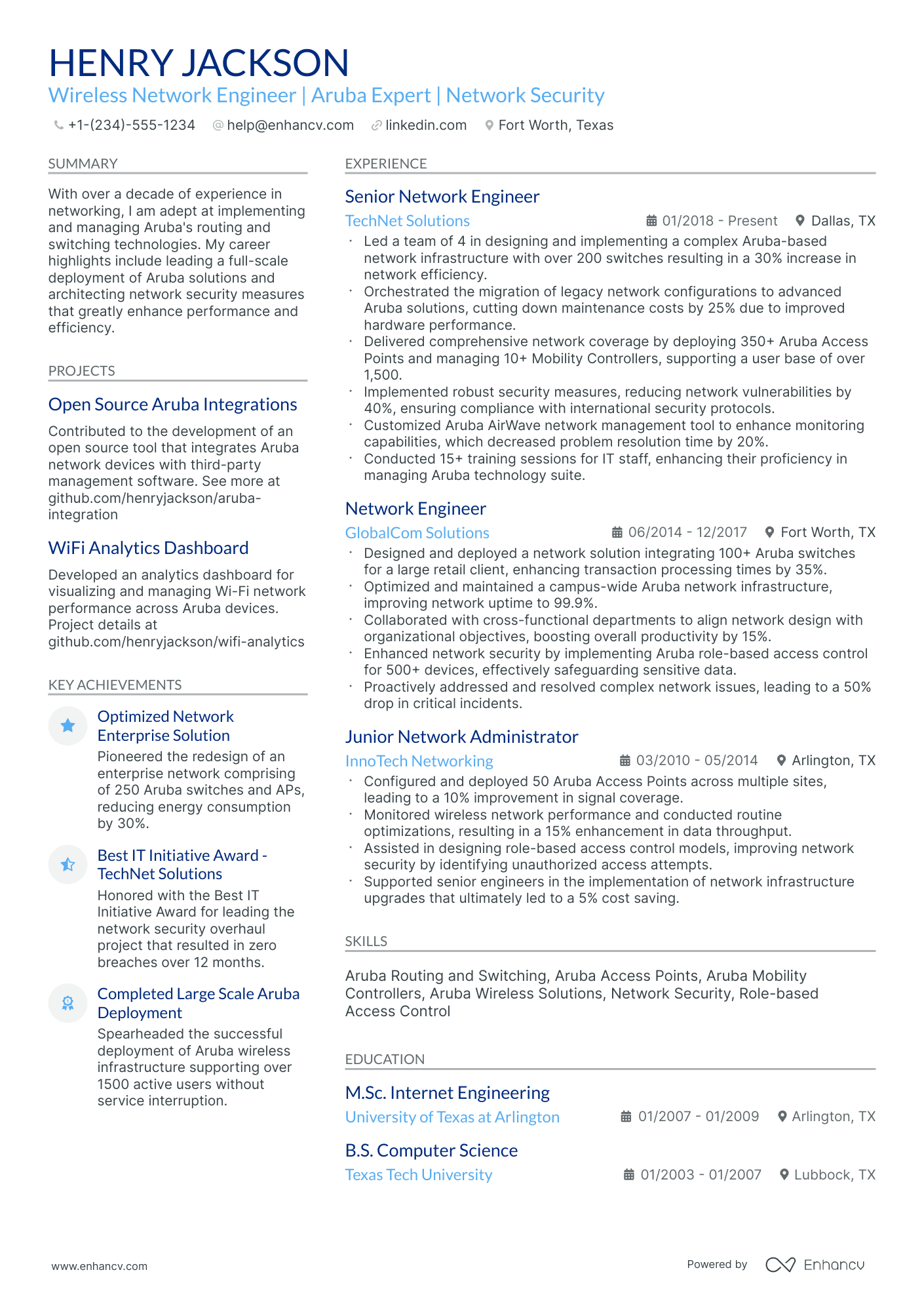As a wireless network engineer, articulating your complex technical experience and certifications in a concise and understandable manner can often be a challenging aspect of resume creation. Our guide offers clear strategies and examples to help you effectively highlight your specialized skills and make your expertise accessible to recruiters and hiring managers.
- Find different wireless network engineer resume examples to serve as inspiration to your professional presentation.
- How to use the summary or objective to highlight your career achievements.
- How to create the experience section to tell your story.
- Must have certificates and what to include in the education section of your resume.
If the wireless network engineer resume isn't the right one for you, take a look at other related guides we have:
- Technology Manager Resume Example
- Software Tester Resume Example
- Application Support Manager Resume Example
- Statistical Programmer Resume Example
- Web Project Manager Resume Example
- Developer Resume Example
- Application Engineer Resume Example
- Desktop Support Resume Example
- Sophomore Engineering Resume Example
- Game Developer Resume Example
Formatting the layout of your wireless network engineer resume: design, length, and more
When it comes to the format of your wireless network engineer resume , you've plenty of opportunities to get creative. But, as a general rule of thumb, there are four simple steps you could integrate into your resume layout.
- If you have plenty of experience, you'd like to showcase, invest in the reverse-chronological resume format . This format focuses on your latest experience items and skills you've learned during your relevant (and recent) jobs.
- Don't go over the two-page limit, when creating your professional wireless network engineer resume. Curate within it mainly experience and skills that are relevant to the job.
- Make sure your wireless network engineer resume header includes all of your valid contact information. You could also opt to display your professional portfolio or LinkedIn profile.
- Submit or send out your wireless network engineer resume as a PDF, so you won't lose its layout and design.
Be aware of location-based layout differences – Canadian resumes, for instance, might differ in format.
Upload & Check Your Resume
Drop your resume here or choose a file. PDF & DOCX only. Max 2MB file size.
PRO TIP
Highlight any significant extracurricular activities that demonstrate valuable skills or leadership.
Fundamental sections for your wireless network engineer resume:
- The header with your name (if your degree or certification is impressive, you can add the title as a follow up to your name), contact details, portfolio link, and headline
- The summary or objective aligning your career and resume achievements with the role
- The experience section to curate neatly organized bullets with your tangible at-work-success
- Skills listed through various sections of your resume and within an exclusive sidebar
- The education and certifications for more credibility and industry-wide expertise
What recruiters want to see on your resume:
- Expertise in wireless standards such as IEEE 802.11 (Wi-Fi), WiMAX, LTE, and other emerging technologies
- Experience with wireless design and simulation tools, such as Ekahau, AirMagnet, or iBwave for network planning and optimization
- Understanding of wireless network security protocols and authentication methods, including WPA, WPA2, WPA3, and 802.1X/EAP
- Proficiency in troubleshooting wireless connectivity issues along with performance tuning of wireless networks
- Demonstrated ability to manage and implement large-scale wireless network infrastructure projects, including access points, controllers, and management platforms
Five dos for building your wireless network engineer resume experience section
The best strategic approach to your wireless network engineer resume experience section is to support your particular responsibilities with actions and achievements.
For example, you could list:
- Up to six responsibilities in your day-to-day work, supported by why they're important for your role, department, or organization;
- Experience items that have helped you sustain and enhance your technical knowledge within the field, or, perhaps, have helped you grow as a professional;
- Any metrics that pinpoint your success within your past roles;
- How you've solved specific problems in your day-to-day work;
- Strategies and solutions you've implemented for growth - and how that growth was measured.
The wireless network engineer resume experience is your best shot at making a good first impression on recruiters. That's why we've included some real-world professional examples to get you thinking about how you present your experience:
- Led the deployment of a city-wide 5G network, overseeing a team of 15 technicians and achieving 99.9% network uptime.
- Collaborated with R&D to implement innovative wireless communication protocols that increased data throughput by 35%.
- Managed vendor relationships, resulting in a 20% cost reduction on hardware procurement and a 15% quicker deployment timeline.
- Spearheaded the upgrade of enterprise WLAN infrastructure, supporting over 10,000 concurrent users and improving network capacity by 40%.
- Developed a comprehensive network security strategy that reduced wireless network vulnerabilities by 50%.
- Authored white papers on wireless technology best practices which have been adopted as internal standards within the company.
- Optimized network performance and capacity through detailed analysis, fine-tuning configurations to handle a 25% increase in mobile data traffic.
- Implemented a new wireless network monitoring solution, improving fault detection by 30%.
- Coordinated with the IT department to ensure seamless integration of wireless LAN with the existing wired network.
- Designed and executed a comprehensive testing strategy for the company's wireless products, leading to a 10% improvement in reliability.
- Provided technical leadership in the deployment of a wireless mesh network, which enhanced coverage and redundancy in high-density user environments.
- Reviewed and updated network documentation and procedures, consolidating best practices across the company's international offices.
- Conducted extensive RF site surveys for network planning, optimizing signal strength and coverage for key client locations.
- Played a key role in a project that integrated IoT devices with wireless networks, facilitating new smart building services.
- Served as a key point of contact for emergency network troubleshooting, maintaining high availability for critical applications.
- Automated wireless network configuration deployment, reducing human error and cutting down on configuration time by 40%.
- Designed and tested multi-vendor WLAN solutions tailored to customer-specific needs, leading to a 20% growth in customer satisfaction.
- Mentored junior engineers and created a shared knowledge base, improving the team's problem-solving efficiency by 25%.
- Pioneered a proprietary software to manage wireless spectrum allocation, significantly reducing interference incidents across the network.
- Managed cross-functional teams to deliver network enhancements on schedule and under budget in 4 consecutive quarters.
- Originated a company-wide training program detailing the technical aspects of emerging wireless technologies.
- Participated in the design and deployment of a nationwide LTE network, resulting in a 30% increase in network coverage for the company.
- Optimized antenna and network configurations to achieve a 15% improvement in signal quality and a reduction in dropped connections.
- Conducted extensive research which contributed to the company securing patents for two wireless networking technologies.
- Led the company's efforts in obtaining Wi-Fi CERTIFIED 6™ status for all new products, ensuring market competitiveness and technology leadership.
- Managed the design and execution of large-scale wireless network installations in public venues, serving over 50,000 users daily.
- Drove the adoption of centralized network management systems, enhancing network visibility and control for the IT department.
- Carried out detailed signal strength testing and analysis for 4G deployment, providing actionable insights that improved network reliability by 20%.
- Collaborated with the team to streamline wireless network operations, leading to a 15% increase in operational efficiency.
- Contributed to the development of disaster recovery plans that minimized downtime during several critical network outages.
The following content includes information from "O*NET OnLine" by the U.S. Department of Labor, Employment and Training Administration (USDOL/ETA). Used under the CC BY 4.0 license. The data represents the top responsibilities present on the task lists for wireless network engineer professionals.
Top Responsibilities for Wireless Network Engineer:
- Develop disaster recovery plans.
- Develop or recommend network security measures, such as firewalls, network security audits, or automated security probes.
- Develop and implement solutions for network problems.
- Maintain networks by performing activities such as file addition, deletion, or backup.
- Coordinate network operations, maintenance, repairs, or upgrades.
- Coordinate installation of new equipment.
- Monitor and analyze network performance and reports on data input or output to detect problems, identify inefficient use of computer resources, or perform capacity planning.
- Develop network-related documentation.
- Develop and write procedures for installation, use, or troubleshooting of communications hardware or software.
- Participate in network technology upgrade or expansion projects, including installation of hardware and software and integration testing.
Quantifying impact on your resume
- Specify the number of wireless access points you managed or installed, demonstrating the scale of your experience.
- Include the percentage increase of network uptime or reliability you achieved through your optimizations.
- Mention the number of networking projects you led or contributed to, showing your active involvement in important tasks.
- Quantify the reduction in network outages or issues due to proactive maintenance or upgrades you conducted.
- Detail the number of users supported in the wireless networks you’ve maintained, indicating your ability to manage large user groups.
- Highlight the percentage of improvement in network speeds or performance metrics after your optimizations.
- Report the amount of cost savings achieved through efficient network design or vendor negotiations.
- Showcase the number of security incidents reduced or resolved, emphasizing your contribution to network safety.
Action verbs for your wireless network engineer resume
Experience section for candidates with zero-to-none experience
While you may have less professional experience in the field, that doesn't mean you should leave this section of your resume empty or blank.
Consider these four strategies on how to substitute the lack of experience with:
- Volunteer roles - as part of the community, you've probably gained valuable people (and sometimes even technological capabilities) that could answer the job requirements
- Research projects - while in your university days, you may have been part of some cutting-edge project to benefit the field. Curate this within your experience section as a substitute for real-world experience
- Internships - while you may consider that that summer internship in New York was solely mandatory to your degree, make sure to include it as part of your experience, if it's relevant to the role
- Irrelevant previous jobs - instead of detailing the technologies you've learned, think about the transferable skills you've gained.
Recommended reads:
PRO TIP
Showcase any ongoing or recent educational efforts to stay updated in your field.
How to showcase hard skills and soft skills on your resume
Reading between the lines of your dream job, you find recruiters are looking for candidates who have specific software or hardware knowledge, and personal skills.
Any technology you're adept at shows your hard skills. This particular skill set answers initial job requirements, hinting at how much time your potential employers would have to invest in training you. Showcase you have the relevant technical background in your communicate, solve problems, and adapt to new environments. Basically, your interpersonal communication skills that show recruiters if you'd fit into the team and company culture. You could use the achievements section to tie in your greatest wins with relevant soft skills.
It's also a good idea to add some of your hard and soft skills across different resume sections (e.g. summary/objective, experience, etc.) to match the job requirements and pass the initial screening process. Remember to always check your skill spelling and ensure that you've copy-pasted the name of the desired skills from the job advert as is.
Top skills for your wireless network engineer resume:
802.11 Standards
RF Design and Planning
Spectrum Analysis
Wireless Security Protocols
Network Protocols (TCP/IP, UDP)
Wi-Fi Configuration and Management
Site Survey Tools (Ekahau, AirMagnet)
Network Monitoring Tools (SolarWinds, PRTG)
MikroTik Router Configuration
Cisco Wireless Solutions
Problem-Solving
Communication
Team Collaboration
Adaptability
Attention to Detail
Time Management
Analytical Thinking
Project Management
Customer Service Orientation
Critical Thinking
Next, you will find information on the top technologies for wireless network engineer professonals from "O*NET OnLine" by the U.S. Department of Labor, Employment and Training Administration (USDOL/ETA). Used under the CC BY 4.0 license.
Top technologies for Wireless Network Engineer’s resume:
- Google Angular
- Spring Framework
- Blink
- Symantec Intruder Alert
- Wireshark
PRO TIP
If you're in the process of obtaining your certificate or degree, list the expected date you're supposed to graduate or be certified.
Education section and most popular wireless network engineer certifications for your resume
Your resume education section is crucial. It can indicate a range of skills and experiences pertinent to the position.
- Mention only post-secondary qualifications, noting the institution and duration.
- If you're still studying, highlight your anticipated graduation date.
- Omit qualifications not pertinent to the role or sector.
- If it provides a chance to emphasize your accomplishments, describe your educational background, especially in a research-intensive setting.
Recruiters value wireless network engineer candidates who have invested their personal time into their professional growth. That's why you should include both your relevant education and certification . Not only will this help you stand out amongst candidates, but showcase your dedication to the field. On your wireless network engineer resume, ensure you've:
- Curated degrees and certificates that are relevant to the role
- Shown the institution you've obtained them from - for credibility
- Include the start and end dates (or if your education/certification is pending) to potentially fill in your experience gaps
- If applicable, include a couple of job advert keywords (skills or technologies) as part of the certification or degree description
If you decide to list miscellaneous certificates (that are irrelevant to the role), do so closer to the bottom of your resume. In that way, they'd come across as part of your personal interests, instead of experience. The team at Enhancv has created for you a list of the most popular wireless network engineer certificates - to help you update your resume quicker:
The top 5 certifications for your wireless network engineer resume:
- Certified Wireless Network Administrator (CWNA) - CWNP
- Certified Wireless Network Professional (CWNP) - CWNP
- Certified Wireless Design Professional (CWDP) - CWNP
- Certified Wireless Analysis Professional (CWAP) - CWNP
- Certified Wireless Network Expert (CWNE) - CWNP
The content below includes information from "O*NET OnLine" by the U.S. Department of Labor, Employment and Training Administration (USDOL/ETA). Used under the CC BY 4.0 license. The data represents the top associations for wireless network engineer professionals.
Top US associations for a Wireless Network Engineer professional
- CompTIA
- Association for Computing Machinery
- Computing Research Association
- IEEE Computer Society
- Institute for Certification of Computing Professionals
PRO TIP
List your educational qualifications and certifications in reverse chronological order.
Recommended reads:
The ideal wireless network engineer candidate resume summary or objective
You may have heard that your resume top one-third plays an important part in your application.
It basically needs to show strong alignment with the job advert, your unique skill set, and your expertise.
Both the resume summary and resume objective could be used to ensure you've shown why you're the best candidate for the role.
Use the:
- Resume objective to pinpoint your current successes, that are applicable to the field, and your vision for your career. Remember to state how you see yourself growing within this new career opportunity.
- Resume summary as an instrument to pinpoint what is most applicable and noteworthy form your professional profile. Keep your summary to be no more than five sentences long.
At the end of the day, the resume summary or objective is your golden opportunity to shine a light on your personality as a professional and the unique value of what it's like to work with you.
Get inspired with these wireless network engineer resume examples:
Resume summaries for a wireless network engineer job
- Seasoned wireless network engineer with over 10 years of dedicated experience in designing, deploying, and maintaining robust wireless networks for multinational corporations. Expertise in RF planning, WLAN infrastructure, and protocol analysis. Proudly spearheaded the successful roll-out of a company-wide wireless upgrade, increasing network efficiency by 40%.
- Dynamic wireless network engineer with a proven track record of 8 years in the industry, specialized in implementing high-density Wi-Fi solutions and advanced security protocols. Holds significant certifications including CWNA and CCNP Wireless. Architected a secure wireless infrastructure for a 500+ user environment, achieving 99.9% uptime.
- Software Developer transitioning to wireless network engineering, bringing a robust background in full-stack development and systems integration. Adept in coding languages and passionate about leveraging this experience to excel in networking. Eager to apply analytical and design skills to develop cutting-edge wireless network solutions.
- Mechanical Engineer pivoting to a career in wireless network engineering, equipped with strong analytical skills and a keen interest in emerging wireless technologies. Skilful in project management and problem-solving, aiming to integrate mechanical systems knowledge with network infrastructure innovation to deliver high-performance wireless solutions.
- Ambitious graduate with a Bachelor's degree in Computers and Information Technology, aspiring to launch a career as a wireless network engineer. Eager to apply a fresh perspective and academic knowledge of network protocols and architectures, with the objective to contribute to the design and implementation of state-of-the-art wireless networks.
- Recent MSc graduate in Telecommunications Engineering, seeking to embark on a professional journey as a wireless network engineer. Committed to applying theoretical knowledge of wireless communication systems and network security to practical environments, aiming to evolve with the ever-changing technological landscape.
Average salary info by state in the US for wireless network engineer professionals
Local salary info for Wireless Network Engineer.” Source: My Next Move, National Center for O*NET Development. Accessed 10/15/2024
| State | Average Salary (in USD) |
|---|---|
| US National Average | $129,840 |
| California (CA) | $144,980 |
| Texas (TX) | $132,400 |
| Florida (FL) | $126,290 |
| New York (NY) | $134,550 |
| Pennsylvania (PA) | $111,650 |
| Illinois (IL) | $131,740 |
| Ohio (OH) | $122,690 |
| Georgia (GA) | $132,370 |
| North Carolina (NC) | $120,660 |
| Michigan (MI) | $105,480 |
Four more sections for your wireless network engineer resume
Your wireless network engineer resume can be supplemented with other sections to highlight both your personality and efforts in the industry. Use the ones you deem most relevant to your experience (and the role):
- Awards - to celebrate your success;
- Interests - to detail what you're passionate about outside of work (e.g. music, literature, etc.);
- Publications - to show your footprint in the wider community;
- Projects - to pinpoint noteworthy achievements, potentially even outside of work.
Key takeaways
- Ensure your wireless network engineer resume uses a simple, easy-to-read format that reflects upon your experience and aligns with the role;
- Be specific within the top one-third of your resume (header and summary or objective) to pinpoint what makes you the ideal candidate for the wireless network engineer role;
- Curate information that is tailored to the job by detailing skills, achievements, and actual outcomes of your efforts;
- List your certifications and technical capabilities to demonstrate your aptitude with specific software and technologies;
- The sections you decide on including on your wireless network engineer should pinpoint your professional expertise and personality.
